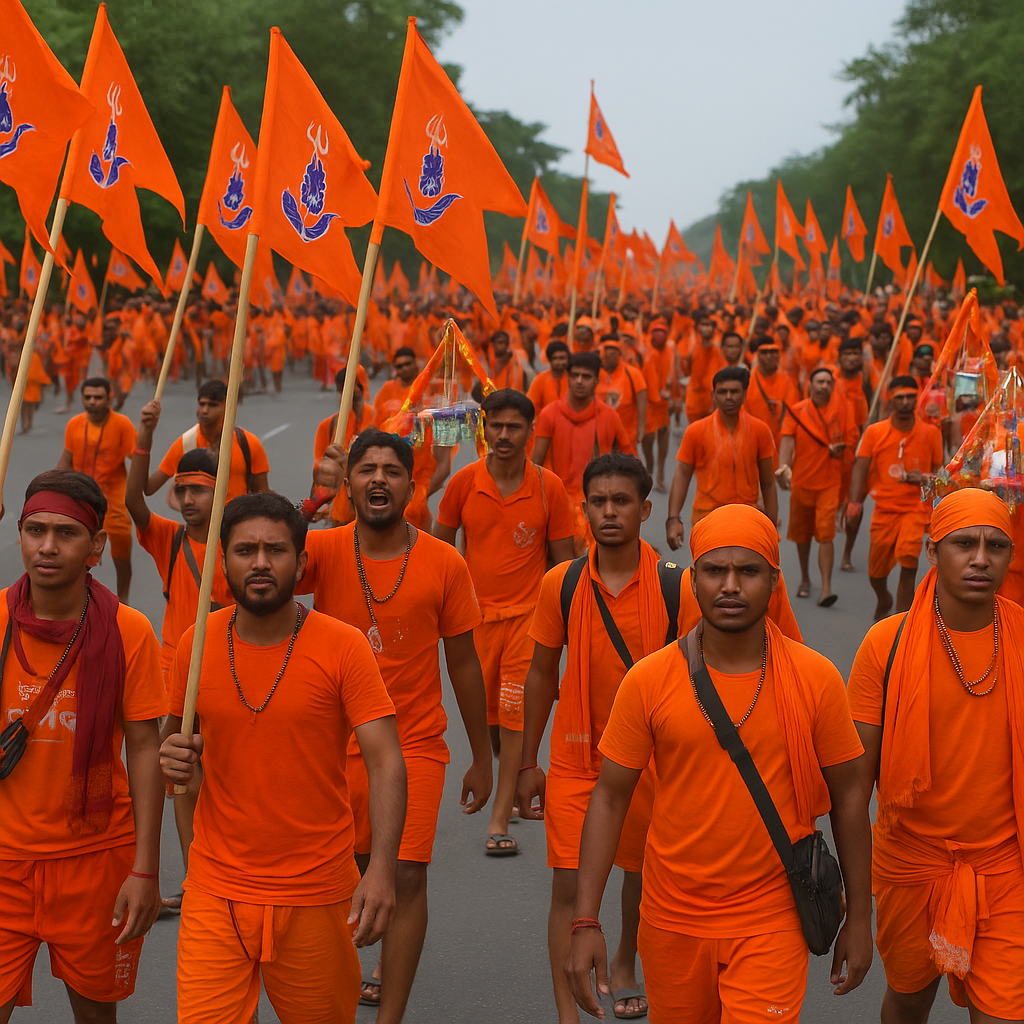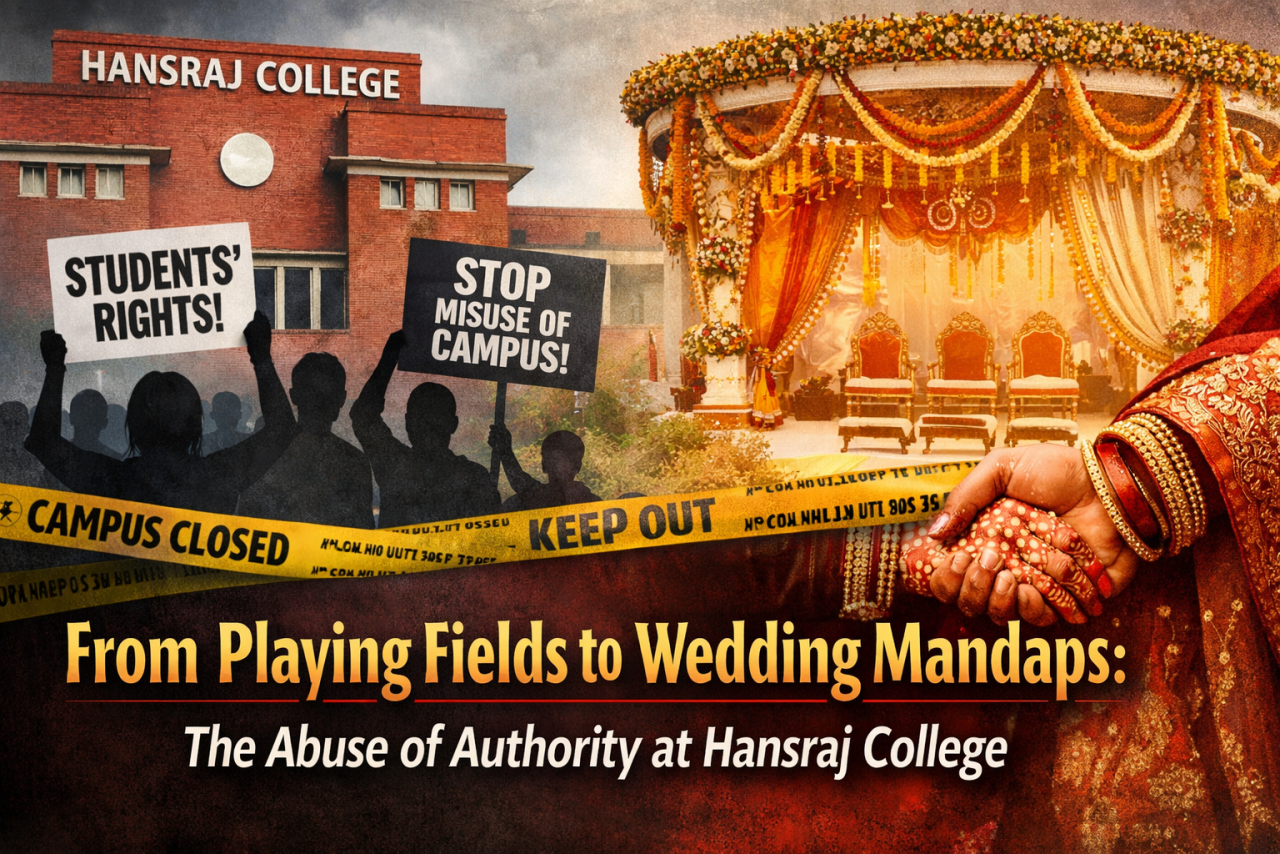
Every year during the Shravan month, the Kanwar Yatra is seen as one of the most significant Hindu pilgrimages. Thousands of saffron-clad devotees, known as Kanwariyas, carry holy Ganga water across long distances to pour over Shivlingas in temples, especially in Deoghar, Haridwar, and Varanasi. What should be a peaceful spiritual journey, however, often turns into a loud, chaotic, and lawless event that disrupts public life, creates fear, and questions the idea of equal law enforcement in a secular country.
The daily media reports highlight this ongoing problem. In one shocking incident at Mirzapur railway station in Uttar Pradesh, a group of Kanwariyas punched and kicked a CRPF jawan over a dispute regarding train tickets. The jawan, Gautam Kumar, was reportedly trying to buy a ticket when the group started arguing with him and then violently attacked him. Despite the presence of other passengers, the pilgrims pinned him to the ground and beat him up. A video of this brutal assault quickly went viral, and three of the attackers were arrested. This was not an isolated case but part of a larger pattern of violence and mob behavior often seen during the Yatra.
In another story from Delhi published by the Hindustan Times, residents described how loudspeakers, boomboxes, and DJ trucks disrupt daily life during the Yatra. The Central Pollution Control Board sets a maximum volume level in residential areas. For daytime it is 55 decibels and for nighttime it is 45 decibels. But during the Yatra, many Kanwariya trucks blast music far beyond legal limits, reaching over 100 decibels. This level of noise is not only illegal but also harmful to human ears. Despite these violations, authorities rarely take action. Many Delhi citizens complained that their homes shake from the sound, children cannot study, and patients suffer due to stress caused by constant noise.
One elderly woman from South Delhi told reporters that while loudspeakers are banned in mosques and even some temples, no one stops Kanwariya trucks from playing music. Another resident shared how festivals that should bring peace now bring anxiety and fear because of the rowdy behavior and complete lack of control during the Yatra.
The key issue here is the double standard in how religious events are treated. When it comes to other faiths, especially Muslims, loudspeakers for prayers have been removed from mosques, and their religious gatherings are strictly monitored. However, during the Kanwar Yatra, it seems like all rules are paused. Police allow highways to be blocked, loud music to be played, and even illegal behavior to go unpunished.
Some of the biggest highways like the Delhi-Meerut Expressway and Delhi-Haridwar roads become nearly unusable during this time. Emergency services are often delayed. Businesses suffer losses. Schools are forced to close. Yet the administration seems more focused on supporting these Yatras than ensuring public order. This is not about disrespecting any religion. It is about applying the law fairly.
The worst part is that many young Kanwariyas, mostly in their teens and twenties, treat the Yatra as a party. They travel in large groups, perform bike stunts, smoke, drink, and take over public spaces in the name of devotion. In many cases, even police vehicles escort them, and local politicians support their behavior to gain votes. This not only damages the image of a religious tradition but also invites violence and creates tension between communities.
The Kanwar Yatra is not the only example of this problem. Other Hindu processions like Ram Navami and Hanuman Jayanti have also seen rising incidents of violence in recent years. The pattern is clear. When it comes to Hindu processions, law enforcement becomes weak. When it is about any other community, the rules are applied strictly. This kind of imbalance creates resentment and threatens the idea of equal rights.
It is important to note that many true devotees do follow the tradition with discipline and silence. They walk miles with proper respect for the ritual and do not cause trouble. However, their sincerity is overshadowed by the loud and dangerous actions of some Kanwariya groups who use religion as an excuse to dominate public spaces.
The solution is not to cancel religious events but to regulate them properly. Police must act against noise violations and public violence, regardless of the faith involved. Rules on loudspeakers must be followed by all. Emergency lanes on roads should always be open. Devotion does not need loudspeakers or mob behavior to be considered holy. Spirituality is about inner peace, not outer noise.
In the end, religion should unite, not divide. It should calm the streets, not turn them into battle zones. If India wants to be a country of faith, it must also be a country of law. The Kanwar Yatra can remain a sacred journey, but only if it returns to its original values of simplicity, humility, and peace.





















